
Frederica von Stade is a semi-retired American classical singer. Best known for her work in opera, she was also a recitalist and concert artist, and she recorded more than a hundred albums and videos. She is especially associated with operas by Mozart and Rossini, and also with music by French and American composers, most notably Jake Heggie. A Chevalier of France's Ordre des Arts et des Lettres, twice the winner of a Grand Prix du Disque and nominated nine times for a Grammy award, she is widely regarded as the pre-eminent lyric mezzo-soprano of her generation.

Mahler Songs is a 40-minute studio album on which Gustav Mahler's Lieder eines fahrenden Gesellen, his Rückert-Lieder and two of the songs from his Lieder aus "Des Knaben Wunderhorn" are performed by Frederica von Stade and the London Philharmonic Orchestra under the direction of Andrew Davis. It was released in 1979.
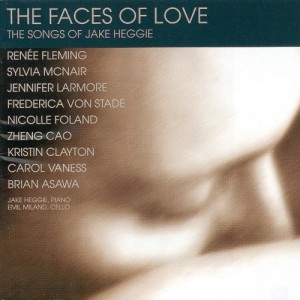
The Faces of Love is a 78-minute studio album of contemporary classical songs composed by Jake Heggie, performed by Brian Asawa, Zheng Cao, Kristin Clayton, Renée Fleming, Nicolle Foland, Jennifer Larmore, Sylvia McNair, Frederica von Stade and Carol Vaness, with piano accompaniment by Heggie and with two contributions by cellist Emil Miland. It was released in 1999.

Shéhérazade is a 40-minute studio album of art songs by Maurice Ravel performed by Frederica von Stade. In the Chansons madécasses, she is accompanied by the flautist Doriot Anthony Dwyer, the cellist Jules Eskin and the pianist Martin Katz. In two of the Cinq mélodies populaires grecques, the Deux mélodies hébraïques and Shéhérazade itself, she is accompanied by the Boston Symphony Orchestra under the direction of Seiji Ozawa. The album was released in 1981.
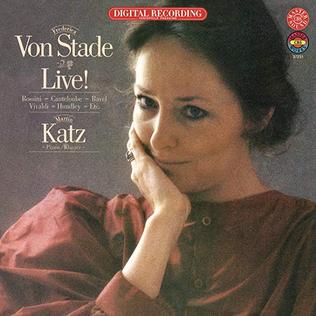
Frederica von Stade Live! is a 46-minute live album of arias, art songs and folk songs from America, France, Ireland and Italy, performed by von Stade with piano accompaniment by Martin Katz. It was released in 1982.
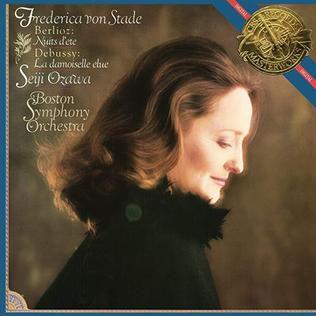
Nuits d'été & La damoiselle élue is a 51-minute studio album of songs by Hector Berlioz and a cantata by Claude Debussy performed by Frederica von Stade, Susanne Mentzer, the Tanglewood Festival Chorus and the Boston Symphony Orchestra under the direction of Seiji Ozawa. It was released in 1984.
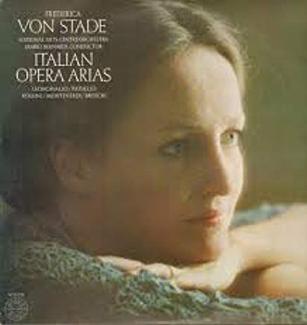
Italian Opera Arias is a studio album of music by Frederica von Stade, Janice Taylor and the National Arts Centre Orchestra under the direction of Mario Bernardi. It was released in 1979.

French Opera Arias is a 51-minute studio album of music performed by Frederica von Stade and the London Philharmonic Orchestra under the direction of John Pritchard. It was released in 1976.

Frederica von Stade: Chants d'Auvergne, Vol. 1 is a 51-minute studio album presenting seventeen of the thirty traditional Auvergnat songs collected and arranged by Joseph Canteloube, performed by von Stade and the Royal Philharmonic Orchestra under the direction of Antonio de Almeida. It was released in 1982. The same artists recorded the rest of Canteloube's Auvergne songs and three mélodies of his own composition for a sequel album, Frederica von Stade: Chants d'Auvergne, Vol. 2, released in 1986.

Frederica von Stade: Chants d'Auvergne, Vol. 2 & Triptyque is a 60-minute studio album containing thirteen of the thirty traditional Auvergnat songs collected and arranged by Joseph Canteloube, together with a song cycle of his own composition, performed by von Stade and the Royal Philharmonic Orchestra under the direction of Antonio de Almeida. It was released in 1986. The same artists recorded Canteloube's seventeen other Auvergnat songs for the album's predecessor, Frederica von Stade: Chants d'Auvergne, Vol. 1, released in 1982.
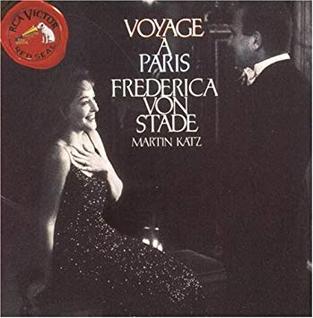
Voyage à Paris is a 70-minute studio album of French art songs performed by Frederica von Stade with piano accompaniment by Martin Katz. It was released in 1995.
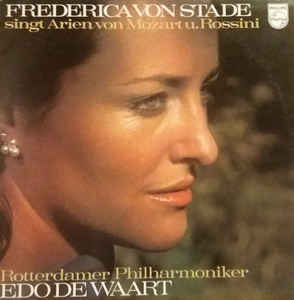
Frederica von Stade sings Mozart & Rossini Arias is a 52-minute studio album of operatic arias performed by von Stade and the Rotterdam Philharmonic Orchestra under the direction of Edo de Waart. It was released in 1976. A second, 69-minute version of the album, Frederica von Stade: Haydn, Mozart & Rossini Arias, released by Philips on CD, adds bonus tracks derived from von Stade's contributions to Antal Doráti's recordings of Joseph Haydn's operas La fedeltà premiata and Il mondo della luna. A third, 52-minute version released on SACD by PentaTone in 2005 reverts to the contents of the first version, but presents the music in quadraphonic surround sound.
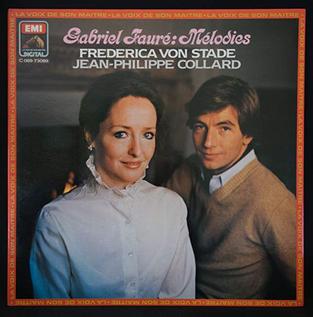
Gabriel Fauré: Mélodies is a 54-minute studio album of eighteen of Fauré's art songs performed by the mezzo-soprano Frederica von Stade with piano accompaniment by Jean-Philippe Collard. It was released in 1983. A second, 57-minute version of the album, released in 2011, includes a bonus track in which von Stade sings the Chanson de Mélisande from Fauré's incidental music for Maurice Maeterlinck's play Pelléas et Mélisande, accompanied by the Orchestre national du Capitole de Toulouse under the direction of Michel Plasson.
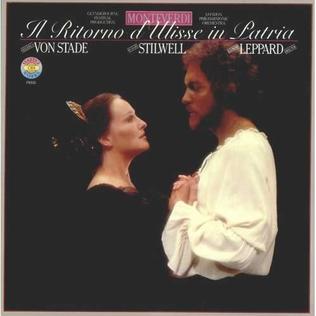
Il ritorno d'Ulisse in patria is a 166-minute studio album of Claudio Monteverdi's opera, performed by a cast of singers headed by Ann Murray, Patrick Power, Frederica von Stade and Richard Stilwell with the Glyndebourne Chorus and the London Philharmonic Orchestra under the direction of Raymond Leppard. It was released in 1980.

Judith Blegen & Frederica von Stade: Songs, Arias & Duets is a 42-minute studio album of art songs, art duets and operatic arias performed by Blegen and von Stade with members of the Chamber Music Society of Lincoln Center. It was released in 1975.

Frederica von Stade chante Monteverdi & Cavalli is a 48-minute studio album of arias by Francesco Cavalli and songs and arias by Claudio Monteverdi, performed by von Stade with the Scottish Chamber Orchestra under the direction of Raymond Leppard. It was released in 1985. A second, 54-minute version of the album, released in 1995 as Recital: Frederica von Stade: Cavalli, Monteverdi & Mozart Arias, added two bonus arias taken from Erato's 1978 recording of Mozart's Così fan tutte, on which von Stade sang Dorabella with the Orchestre Philharmonique de Strasbourg under Alain Lombard.

Marilyn Horne & Frederica von Stade: Lieder & Duets is a 49-minute classical studio album in which Horne sings songs by Robert Schumann and Antonin Dvoŕák, and Horne and von Stade sing duets by Felix Mendelssohn Bartholdy, all accompanied by Martin Katz on the piano. The recording was released in 1993.
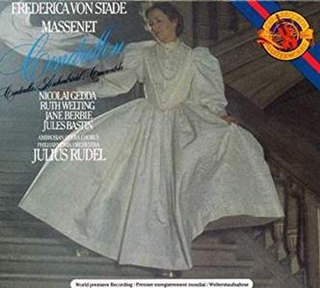
Cendrillon is a 136-minute studio album of Jules Massenet's opera, performed by a cast led by Elizabeth Bainbridge, Jules Bastin, Jane Berbié, Teresa Cahill, Nicolai Gedda, Frederica von Stade and Ruth Welting with the Ambrosian Opera Chorus and the Philharmonia Orchestra under the direction of Julius Rudel. It was released in 1979.

Marilyn Horne: Divas in Song: A 60th Birthday Celebration is a 77-minute live album of art and popular songs performed by Olafur Bjarnason, Montserrat Caballé, Helen Donath, Renée Fleming, Samuel Ramey, Frederica von Stade, Ruth Ann Swenson and Marilyn Horne herself, with piano accompaniment by Manuel Burgueras, Klaus Donath, Warren Jones, Martin Katz and James Levine. It was released in 1994.
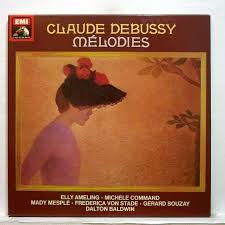
Debussy Mélodies is a 178-minute studio album of sixty of Claude Debussy's art songs, presented roughly in order of composition, performed by Elly Ameling, Michèle Command, Mady Mesplé, Frederica von Stade and Gérard Souzay with piano accompaniment by Dalton Baldwin. It was released in 1980.






















